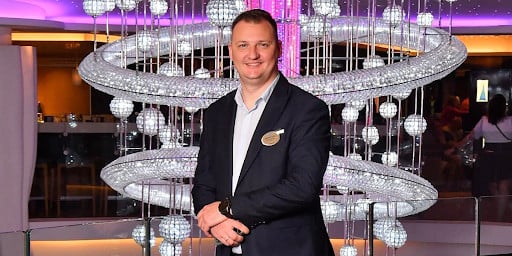
The cruise industry runs on precision: safety, guest communications, and crew operations must follow a single, consistent system. Anton Plitko turns that requirement into practice, implementing safety and CX protocols, defining measurable KPIs, and assigning roles so crews act with the same rigor across different vessels. The operational effect is visible: mandatory procedures move faster, risk and front-office load decline, while guest satisfaction and ancillary revenue rise. “On-board communication is the infrastructure of processes. Without it, processes fall apart,” Plitko says. This logic is a working method, proven over years in the field.
Experience and Scope: Business Manager at Royal Caribbean and Norwegian Cruise Line
A linguistics background, Bachelor’s degree in Spanish Translation (2008); Master’s degree in English Translation (2009), laid the foundation for a management career in operations, where precision, clarity, and disciplined communication define the approach. In an international cruise environment, where English and Spanish are the primary working languages, that combination became a competitive edge. On this basis, Plitko took senior roles at two global operators. At Royal Caribbean International (2015–2019), as a Business Manager, he led the design and rollout of multilingual safety and service protocols on large ships with multi-layered crews. At Norwegian Cruise Line (2022–2024), also as a Business Manager, he scaled the approach across vessels and rotations, strengthening training and quality control.
His remit included standardized actions for routine and non-routine situations, unified terminology for briefings and alarms, clear medical-escalation algorithms, and service-recovery principles with an uncompromising priority on safety. The focus was less on wording than on the system itself: who communicates what and when, through which channel, how task completion is recorded, and how deadlines are controlled. To ensure consistent execution fleet-wide, Plitko built a transparent, manageable framework: version control for documents, short training modules with regular re-certification, quality audits, and a continuous “ship-to-shore” channel for rapid updates after real voyages.
In practice, this produced operational predictability: mandatory procedures ran more smoothly, multilingual announcements were equally clear, repeat desk inquiries fell, and the front office operated more steadily, without compromising safety. His management standing is supported by Royal Caribbean leadership programs, Getting Started as a New Leader (2012), and ALPS: Accelerating Leadership Performance Series (2016), as well as Vacation Hero recognition and strong performance ratings at Norwegian Cruise Line.
According to NCL internal performance reviews, Plitko demonstrated deep command of every operational stage, systematic efficiency gains, and rapid closure of guest requests, on average, within 24 hours after voyage completion. Colleagues describe his style as strict yet rational: safety and service do not compete; they reinforce one another. “Clarity first, then speed. When everyone knows what to do and when to do it, results become stable.” Plitko says. The logic delivered measurable outcomes: higher guest satisfaction, fewer delays, and improved internal KPIs for punctuality and client interaction quality.
United States: Launching a New Project and Advancing Management Expertise

Today, Anton Plitko is finalizing the launch of Plitko Cruise Excellence Consulting in Miami. The firm unites his years at Royal Caribbean and Norwegian Cruise Line with the current needs of the U.S. market. Its core is practical solutions: standardized multilingual safety protocols, communications playbooks for ships and terminals, concise training and certification programs, and SOPs (Standard Operating Procedures) for cross-cultural work and crisis scenarios.
The company is being built as an applied center of expertise able to adapt leading maritime standards to U.S. infrastructure, from major ports to regional operators. The project reflects a strategic industry trend: heightened attention to safety, language adaptation, and efficient crew-to-passenger interaction.
This initiative is a logical continuation of Plitko’s management trajectory. His systems approach, integrating safety, service, and communication into a single governed structure, sets the basis for the firm’s growth. As the U.S. cruise sector pursues transparency, efficiency, and language accessibility, such standards evolve from internal regulations into a competitive advantage.
Plitko’s experience enables not only the rollout of procedures but the construction of managed, scalable operating models across ports and companies. That is the project’s core promise: repeatable solutions that increase business resilience, customer trust, and sector-wide economic returns. It aligns with today’s market demand, where process quality is a primary growth catalyst and a factor of national competitiveness.
Disclaimer
The information contained in South Florida Reporter is for general information purposes only.
The South Florida Reporter assumes no responsibility for errors or omissions in the contents of the Service.
In no event shall the South Florida Reporter be liable for any special, direct, indirect, consequential, or incidental damages or any damages whatsoever, whether in an action of contract, negligence or other tort, arising out of or in connection with the use of the Service or the contents of the Service.
The Company reserves the right to make additions, deletions, or modifications to the contents of the Service at any time without prior notice.
The Company does not warrant that the Service is free of viruses or other harmful components












